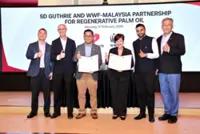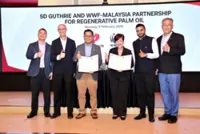Under a moonlit sky close to midnight on Aug 13, 2022, the soft whispers of waves greeted a nesting marine turtle.
She is a green turtle, one listed as “endangered” by the IUCN Red List of Endangered Species.
Pok Jamil, a dedicated local turtle guardian, watched as the turtle emerged from the sea, dragging her heavy shell onto the sands of Pantai Telaga Papan in Setiu, Terengganu.
Her turtle tag reads MY(TGG)1030 – MY for Malaysia, TGG for Terengganu and 1030 her unique identification code.
For this story, she is Melur.
Born on this very beach, she has returned to give birth to the next generation.
With great care, she dug a nest and laid 70 precious eggs.
Due to the stringent monitoring efforts of our turtle guardians, every single egg was protected and brought back to the hatchery, giving them the best chance to hatch safely.
In time, 66 of the 70 turtle eggs hatched – a remarkable 94% hatch success rate.
Melur’s tiny hatchlings emerged, scurrying on the beach, guided by the horizon and waves, embarking on their perilous journey into the deep ocean.
Unbeknown to Jamil, Melur had been here four years earlier.
On Aug 2, 2018, she had nested on the same beach, laying 68 eggs with 61 hatchlings journeying into the open sea.
Melur is a resilient mother turtle, but her return is not always guaranteed.
Melur’s nesting activities are testaments to the resilience of marine turtles, but also a reminder of the threats they face.
Turtle poaching, egg harvesting, and unsustainable coastal development continue to endanger these ancient creatures.

Poachers seek turtle eggs for sale and consumption, disrupting an already fragile life cycle.
Without protection, countless eggs would be lost, diminishing the number of turtles that might one day return to nest.
This is why nesting monitoring is crucial.
By safeguarding nests, we prevent poaching and give hatchlings the highest chance of survival, says protectors like Jamil.
Climate change also poses a growing threat; experts said rising sand temperatures could skew the sex ratio of hatchlings, leading to fewer males and making it harder for marine turtles to breed in the future.
To counter this, the hatchery’s temperature is monitored to facilitate a balanced development for future marine turtle populations.
Marine turtles like Melur are highly migratory, travelling thousands of kilometres across oceans.
According to WWF-Malaysia, tagging nesting mothers allows for critical insight into their lives and these records help conservationists track their return journeys.
In the unfortunate event of poaching or accidental capture in foreign waters, it also helps identify affected populations.
Melur’s return to Telaga Papan is a beacon of hope, WWF-Malaysia said in a press release.
“Yet, can she and her future generations continue to find sanctuary on their nesting beach?
“Coastal erosion, spurred by climate change and human activity, threatens nesting beaches like Telaga Papan.
“Development along coastlines, pollution and unsustainable tourism further disrupt nesting activities.
“Plastic pollution poses an additional silent killer – entangling newborn turtles or disrupting turtle nesting,” the NGO said.
WWF-Malaysia, alongside the Terengganu Fisheries Department and dedicated turtle guardians like Jamil, are working tirelessly to combat these threats.
“Nesting monitoring, coastal rehabilitation efforts such as planting native vegetation for shading, beach profiling to monitor erosion, and advocacy for stronger habitat protection ensure that nesting beaches remain safe havens for generations of turtles to come.
“A mother turtle lays countless eggs in her lifetime, yet only one in a thousand hatchlings survive to adulthood and return to nest.”
Each egg, each hatchling and each nesting mother is precious.
“As we celebrate Mothers Day, let us remember the odyssey of turtle mothers like Melur that against all odds, return to continue the cycle of life. But they cannot do it alone.
“We must stand as their guardians.”
WWF-Malaysia said the public could help by:
> Not eating turtle meat or eggs;
> Keeping beaches clean, which includes not littering;
> Avoiding visits to nesting beaches at night, so as not to disturb nesting mothers;
> Supporting conservation efforts and responsible ecotourism;
> Reporting to Fisheries Department if you witness marine turtle poaching or stranding, by calling 03-8870 4058.
“Melur has nested twice between 2018 and 2022. Perhaps in 2026 or 2027, she will return once more,” said WWF-Malaysia.
“With the unwavering efforts of turtle guardians and public support, we can continue to welcome and protect these remarkable mothers.
“As we honour mothers everywhere, let’s also safeguard our mother turtles.
“Together, we can nurture a future where marine turtles continue to thrive alongside humankind,” WWF-Malaysia added.
The turtle guardian programme in Terengganu is run by Fisheries Department with support from WWF-Malaysia.





